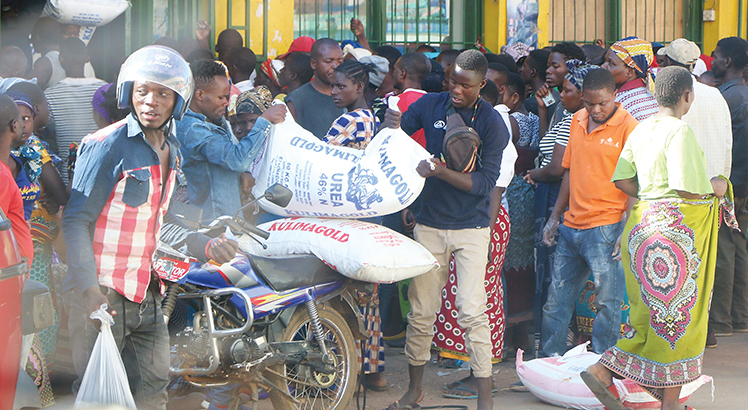Tussle over AIP purchases
Parliamentary Committee on Agriculture (PCA) is locked in a tussle with government over how the country should procure fertiliser for the 2022/23 Affordable Inputs Programme (AIP) amid the commodity’s rising price.
The committee wants government to do away with Fertiliser Association of Malawi (FAM), an umbrella body of fertiliser suppliers, to import and supply fertiliser for farmers in the country.
In an interview, PCA’s chairperson Sameer Suleman said his committee recommended to the Ministry of Agriculture to sidestep the association and procure the commodity directly from manufacturers to cut costs.
Said Sulleman: “Our recommendation still remains that government can obtain cheaper fertiliser if it starts buying directly from the manufacturers other than buying through these middlemen operating under Fertiliser Association of Malawi.”

Without giving figures, he claimed recent quotations indicate fertiliser prices in Asia and America had been dropping when locally they continue rising.
“Government must stop taking advice from these middlemen on how we should go about buying fertiliser. This is not on, we discourage it entirely. Our stand remains government must stop dealing with Fertiliser Association. If this continues then Parliament will take action using relevant legal means,” said Suleman, a Democratic Progressive Party (DPP) legislator for Blantyre City South East.
But the Ministry of Agriculture has remained mum on the recommendation arguing Cabinet will soon make a decision on what is a workable and more effective implementation of the AIP this year.
“We are not commenting anything on AIP issue. But we will do so at an appropriate time as we are waiting for a go-ahead from Cabinet on the proposal the ministry made. So whatever transpires [from Cabinet] we will update the nation,” said the ministry’s spokesperson Gracian Lungu on Thursday.
He said AIP has become a sensitive issue as it involves several players so “we all want to be talking one language after Cabinet’s decision on the proposed implementation plan”.
However, Lungu could not disclose what had been proposed but stated that the PAC was aware of what the ministry proposed.
He said: “The committee knows what is going on and how government intends to implement this year’s programme. It’s a committee we value most because they are the owners of the agricultural budget so we will talk and move forward.”
In the 2022/23 National Budget, AIP has been allocated K109.5 billion which is K33 billion lower than the previous year’s K142 billion allocation. Government is expected to use K97 billion on fertiliser and K12 billion on subsidising maize seeds.
Local prices of AIP subsidised fertilisers, CAN and Urea, have jumped from just above K30 000 last year to more than K60 000 this year, a development FAM attributed to the recent 25 percent devaluation of the Malawi kwacha and the war between Ukraine and Russia—the world’s fourth major fertiliser producer.
Retail fertiliser prices in neighbouring Tanzania, Mozambique and Zambia reveal significant differences with those on the Malawian market.
For instance, a 50 kg bag of fertiliser in Tanzania is selling between 73 468 and 75 526 shillings which is equivalent to between K32 082 and K32 980, according to recent prices released by the Tanzania Fertiliser Regulatory Authority statement.
In Zambia, a 50 kg bag of the same fertiliser is fetching between 750 and 900 Zambian kwacha. This translates to between K47 152 and K56 583. This is despite the prices also being on an upswing over the past few months in that country.
Similarly, in Mozambique a 50kg bag of fertiliser is fetching between 2 750 and 3 510 Mozambican metical, which is between K43 917 and K56 054.
A Mzuzu University agricultural economist, Christopher Mbukwa, shared the PCA’s advice to government to circumvent the private sector and purchase the fertilisers directly from the manufacturers.
He said considering the rising cost of AIP any suggestion leading to a reduction in the cost of fertilizers was a welcome idea.
“The savings are likely to come as a result of bulk buying from the manufacturers. But I must be quick to caution that there is need to establish how much would be saved by purchasing directly from the manufacturers,” Mbukwa said.
However, he also bemoaned that the domestic fertilizer market is dominated by few companies, thus giving room for price collusion.
But a Lilongwe University of Agriculture and Natural Resources (Luanar) agricultural and development economist Henry Kamkwamba from the while agreeing with the moral argument of the parliamentary committee said economically the move was not viable.
He said: “Even across the developed world, the State has never been efficient at conducting market operations or activities because of capacity and other factors. It’s always the private sector that delivers because they are always profit-oriented.”
Kamkwamba, however, observed that the local fertiliser market was dominated by few traders, a development he stated may lead to price collusion.
“The committee is right to question because the mark-ups are really exorbitant as they result in government wasting a lot of public funds. Government just needs to open up to many fertiliser companies. That will bring competition and drive down the mark-ups compared to the current scenario.
“The parliamentary committee just needs to push for proper laws and regulatory structure that would create conducive environment for fertiliser traders in the country and not pushing government to start buying independently as that is not economically feasible,” he said.





